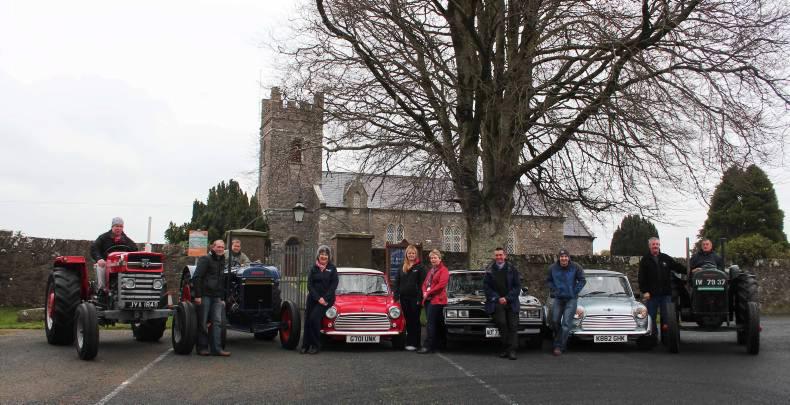I recently came across an interesting book called Instructions for Small Farmers of Ireland in my own archives after an attempt at tidying my home office. The book was produced for the small farmers of Ireland in 1847, just a few years after the potato famine.
It was written by one of the country’s few agriculturalists of the time, James Clapperton, who lived and farmed at Vicarstown House, Stradbally, Co Laois.
James wrote the 36-page booklet in order to inform farmers that there were other crops than potatoes that were needed to help the deprived soils to get back into a more fertile condition. What is interesting is that some of his instructions are still valid today, some 168 years later.
He introduced the book as follows: “Long and extensive experience as a practical Agriculturalist in Ireland, visiting from farm to farm in various localities, has made me familiarly acquainted with your general soils, your general wants, and with that kind of information which is most likely to suit you, I am therefore led to think that a few plain practical directions, in the shape of a written Address, may be of use to you in your present trying emergency.”
He urged farmers never to cultivate potatoes on a scale so very unsafe for the country and so much at variance with the principles of good farming.
He urged potato planting in smaller amounts, but not later than the middle of March and in drills rather than in lazy beds if the soil conditions allowed it.
Greatest robber
“The potato was the greatest robber that ever was in Ireland. Every other green crop leaves a fair quantity of manure upon the farm, in proportion to the nutrient constituents which it extracted from the soil during its growth,” he wrote.
James was a big advocate for the turnip. “The turnip is the mother of the dunghill and the dunghill is the mother of everything else,” he wrote.
He felt that green cropping was the very soul or essence of farming and that turnips are placed at the very head of this system.
He wrote that, before farmers can increase their acreable return in the shape of grain, or extend its cultivation, farmers must increase and enrich their dunghills, and he believed that this could only be effected through the medium of green cropping and house feeding to produce a valuable farmyard manure.
And as a final thought, he suggested that using farmyard manure from the dunghill on stubble ground for a following crop of grain was unwise and unprofitable.
“The folly of an immediate application of manure to stubble ground for the same purpose must be apparent,” he wrote.
He suggested a crop rotation of turnips, mangels, peas or beans followed by wheat, barley or oats let out with clover and grass, followed by clover and grass for hay and wheat or oats on the fourth year of the rotation.
Many years on, James Clapperton’s advice still holds firm. He final words were: “Unless you adopt an alternate system of green and white cropping, you will never be able to keep up, or increase the fertility of the soil and therefore will never farm upon a remunerating scale.”
Clogherny Vintage Fayre
Over the last few months, a small organising committee, local firms, farmers and members of Clogherny, Seskinore and Drumnakilly churches have been working together to plan for the second vintage fayre at Clogherny.
Following the success of last year’s inaugural event, Clogherny Vintage Fayre will take place this year on Saturday 23 May in a field on Church Road, just around the corner from the parish church.
The fayre will include vintage tractors, cars and machinery and a number of local craft stalls offering their wares.
There will be a slow tractor race at 3pm and new this year is a scarecrow competition, with prizes offered to all entrants.
This year, the fayre proceeds will be split between Sarcoidosis Support, local charity Care for Cancer and the church rectory fund.
Deborah Moore on 0044-7783827623 has more information.
Dean’s Wish to Walk
Courtbrack Vintage Society’s annual road run, which takes place on Sunday 17 May, will support six-year-old Vicarstown boy Dean Crawford by raising funds for Dean’s Wish to Walk.
Dean’s love of tractors is no secret, so it seems fitting that Dean’s fund will benefit from the run.
Club PRO John Mulcahy (087-7838513) said that in a break with tradition, the run is open to all tractors, both vintage and modern, as well as vintage cars and motorcycles.
Date Event Location Contact
17 May Courtbrack vintage tractor run Cork 087-7838513
17 May Ballincollig Vintage Club charity run Cork 087-9096616
22-23 May 100-mile tractor run – Virginia to Ballyroan Laois 087-6329362
23 May Carnlough vintage pig race Carnlough, Armagh 0044-7963517407
23 May Tamlaght O’Crilly parish vintage rally Derry 028/048-29541134
23 May Mid-Ulster vintage car run Magherafelt, Derry 0044-7887948543
23 May Clogherney vintage fayre Omagh, Tyrone 0044-7783827623
24 May Balscadden Tractor Group road run Dublin 087-9489834
24 May Ballyroan vintage rally Laois 087-2857270
24 May North Galway vintage show Moylough, Galway 086-8510445
24 May Dromcollogher steam and vintage rally Limerick 086-8837828
29 May Seaforde Vintage Club road run Down 0044-7801980324
30 May Northern Ireland engine rally Patterson’s Mill, Antrim 028/048-90848154
30 May Derrygortreavy vintage rally Dungannon, Tyrone 0044-7593-915320
30 May Portglenone vintage rally Antrim 0044-7500502697
30 May Derrykeighan parish vintage rally Antrim 028/048-20741110
31 May Border counties silage challenge Aughnafarcon, Monaghan 086-6033288
31 May South Leitrim/sest Cavan vintage day Ballinamore, Leitrim 087-9806974






SHARING OPTIONS